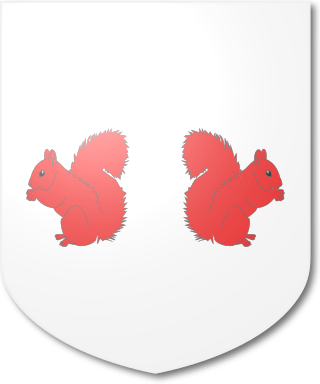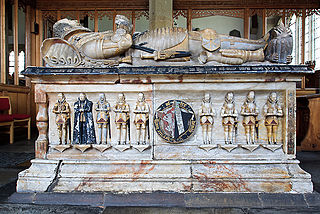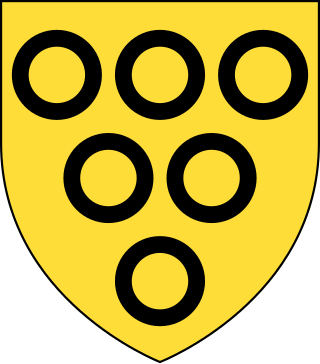
There have been six baronetcies created for persons with the surname Smyth, two in the Baronetage of England, one in the Baronetage of Great Britain, one in the Baronetage of Ireland and two in the Baronetage of the United Kingdom. One creation is extant as of 2010.

There have been twenty one baronetcies created for persons with the surname Williams, eight in the Baronetage of England, three in the Baronetage of Great Britain and ten in the Baronetage of the United Kingdom. Only six of the creations are extant as of 2017.

The Samwell Baronetcy, of Upton in the County of Northampton, was a title in the Baronetage of England. It was created on 22 December 1675 Thomas Samwell, later Member of Parliament for Northamptonshire and Northampton. He was the great-grandson of Sir William Samwell, Auditor of the Exchequer to Queen Elizabeth I of England. The second Baronet sat as Member of Parliament for Coventry. On the death of the fourth Baronet in 1789, the title became extinct.
The Worsley family is an English family that is derived from Sir Elias de Workesley, a Norman knight who was a youth at the time of the Norman conquest. He later accompanied Duke Robert II of Normandy on the First Crusade and was buried at Rhodes.

There have been two baronetcies created for members of the Salusbury family, the first in the Baronetage of England and the second in the Baronetage of Great Britain. Neither title has survived to the present day although the senior baronetcy is technically considered to be dormant.

There have been five baronetcies created for members of the old established family of Peyton of Peyton Hall in the parish of Boxford in Suffolk, all of whom were descended from Sir Robert Peyton of Isleham in Cambridgeshire, grandson and heir of Thomas Peyton (1418–1484) of Isleham, twice Sheriff of Cambridgeshire and Huntingdonshire, in 1443 and 1453. All the baronetcies are extinct.

There have been three baronetcies, all in the Baronetage of England, created for members of the Spencer family, both for descendants of two younger sons of Sir John Spencer (1524–1586) of Althorp, Northamptonshire.
The Bland Baronetcy, of Kippax Park in the County of York, was a title in the Baronetage of England. It was created on 30 August 1642 for Thomas Bland, of Kippax Park, near Leeds, Yorkshire, in honour of his father's service to King Charles I. The third Baronet succeeded his father as an infant, died at the age of five and was succeeded by his brother who was Member of Parliament for Appleby 1681 and for Pontefract 1698–1713. The fifth Baronet represented Lancashire 1713–27 and the sixth Baronet served as member for Ludgershall 1754–5. His brother succeeded in 1755 but died in 1756, at which time the baronetcy became extinct.

There have been two baronetcies- both extinct- granted to the Willises of Fen Ditton, both in the Baronetage of England.
The Kyrle Baronetcy, of Much Marcle in the County of Hereford, was a title in the Baronetage of the United Kingdom. It was created on 12 May 1627 for John Kyrle, twice High Sheriff of Herefordshire. His grandson, the second baronet, sat as Member of Parliament for Herefordshire. The title became extinct on his death in 1680. They were seated at Homme House, Much Marcle.

The Vandeput Baronetcy, of Twickenham in the County of Middlesex, was a title in the Baronetage of Great Britain. It was created on 7 November 1723 for Peter Vandeput. The title became extinct on the death of the second Baronet in 1784. George Vandeput, illegitimate son of the second Baronet, was an Admiral in the Royal Navy.
The Woodford Baronetcy, of Carleby in the County of Lincoln, was a title in the Baronetage of Great Britain. It was created on 28 July 1791 for Ralph Woodford, the former Ambassador to Denmark. The second Baronet was Governor of Trinidad between 1813 and 1828. The title became extinct on his death the latter year.

The Lawrencebaronetcy, of Loseby in the County of Leicester, was a title in the Baronetage of Great Britain. It was created on 17 January 1748 for Edward Lawrence, Esq., with remainder to his great-nephew, Isaac Woollaston of Lowesby Hall, Leicestershire. Lawrence was MP for Stockbridge. He died in 1749 and was succeeded according to the special remainder by his great-nephew, Isaac Woollaston, the second baronet. He was the grandson of Josiah Woollaston (1652–1689) by his wife Elizabeth Lawrence, sister of the first baronet. The title became extinct on the death of the second baronet's son, the third baronet, who died as a child in 1756.

The Lovett Baronetcy, of Liscombe House in the County of Buckingham, was a title in the Baronetage of Great Britain. It was created on 23 October 1781 for Jonathan Lovett of Liscombe in the parish of Soulbury, Buckinghamshire. He was subsequently offered a peerage but declined, on the grounds that his only son had died. Lovett married Sarah Darby, but died in 1812 without surviving male issue, his son Robert Turville Jonathan Lovett having pre-deceseased him in 1807, and thus the title became extinct.

The Winch Baronetcy, of Hawnes in the County of Bedford, was a title in the Baronetage of England. It was created on 9 June 1660 for Humphrey Winch, subsequently Member of Parliament for Bedford, Bedfordshire and Great Marlow and a Lord Commissioner of the Admiralty. He was the grandson and namesake of Sir Humphrey Winch. Winch had no sons and the title became extinct on his death in 1703, although it was erroneously assumed by his nephew, Humphrey Winch, of Branston, Lincolnshire.

The Guldeford Baronetcy, of Hempsted Place in the County of Kent, was a title in the Baronetage of England. It was created on 4 February 1686 for Robert Guldeford. The title became extinct on his death in circa 1740. The Guldeford family descended from Sir John Guldeford, Comptroller of the Household during the reign of King Edward IV. After supporting the Earl of Richmond, Sir John and his son, Sir Richard Guildford, were attainted by Parliament. However, they were restored to favour after the accession of Henry in 1485. Sir Richard gained prominence under Henry and notably served as Master of the Ordnance. By his first wife Sir Richard was the father of Sir Edward Guildford, Lord Warden of the Cinque Ports and Master of the Ordnance, whose daughter Jane Guildford married John Dudley, 1st Duke of Northumberland. Sir Richard Guildford's second son by his first wife, George Guildford, of Hempstead Place, Kent, was the father of Sir John Guldford, High Sheriff of Kent during the reign of Edward VI. Sir John's son Sir Thomas Guldford entertained Elizabeth I in 1575. Sir Thomas was the great-great-grandfather of Sir Robert Guldford, 1st Baronet.

The Stepney Baronetcy, of Prendergast in the County of Pembroke, was a title in the Baronetage of England. It was created on 24 November 1621 for John Stepney. His son, Sir John, the third Baronet represented Pembroke and Haverfordwest in Parliament. The latter's nephew, the fourth Baronet, married Justina, daughter of Sir Anthony van Dyck. Their only son, Sir Thomas, the fifth Baronet, sat as Member of Parliament for Carmarthenshire. Sir Thomas's great-grandson, Sir John, the eighth Baronet, represented Monmouth in Parliament and served as Envoy to Dresden and Berlin. The eighth Baronet never married and was succeeded by his younger brother, Sir Thomas, the ninth Baronet, on whose death in 1825 the baronetcy became extinct.

The Wintour Baronetcy, of Hodington in the County of Worcester, was a title in the Baronetage of England. It was created on 29 April 1642 for George Wintour. He was childless and the title became extinct on his death in 1658.
Sir Cyril Wyche, 1st Baronet was an English diplomat who served as Envoy Extraordinary to Hamburg Envoy Extraordinary and Minister Plenipotentiary to Russia.

The Lowther baronetcy, of Marske in the County of York, was created in the Baronetage of England on 15 June 1697 for the 21-year-old William Lowther, subsequently Member of Parliament for Lancaster. His father was Anthony Lowther. He was the grandson of the London merchant Robert Lowther, brother of Sir John Lowther of Lowther Hall, the father of Sir John Lowther, 1st Baronet, of Lowther.















